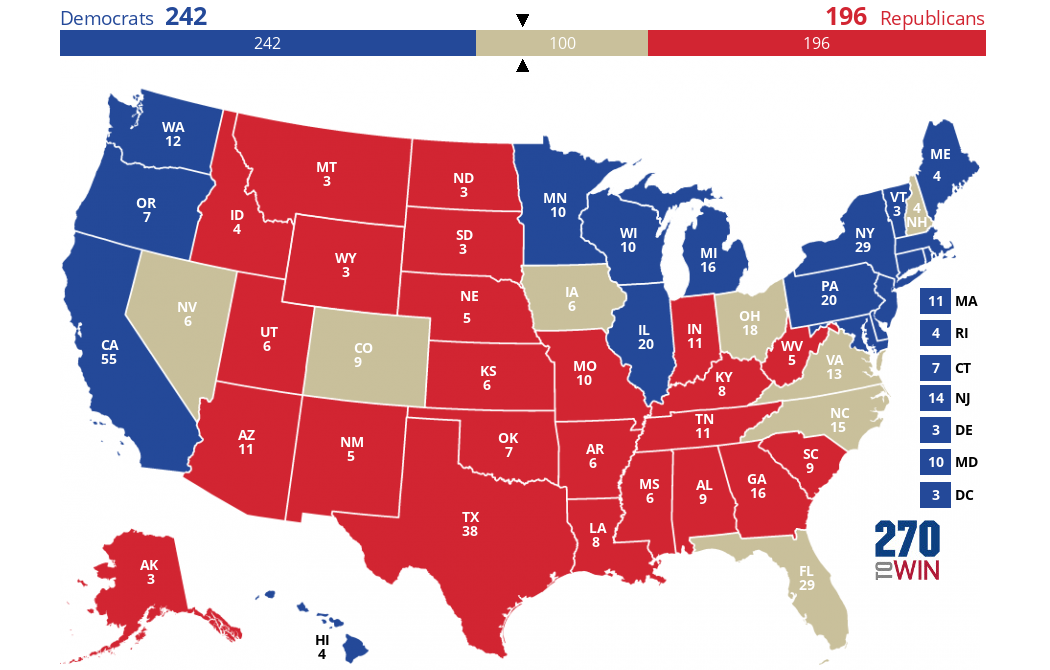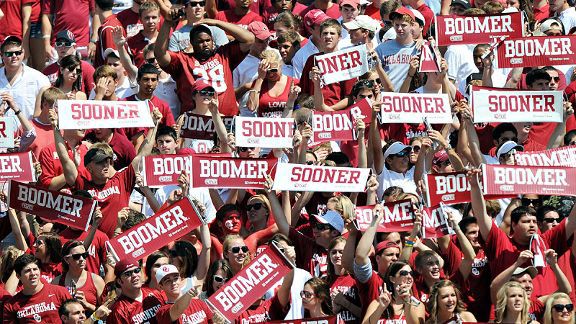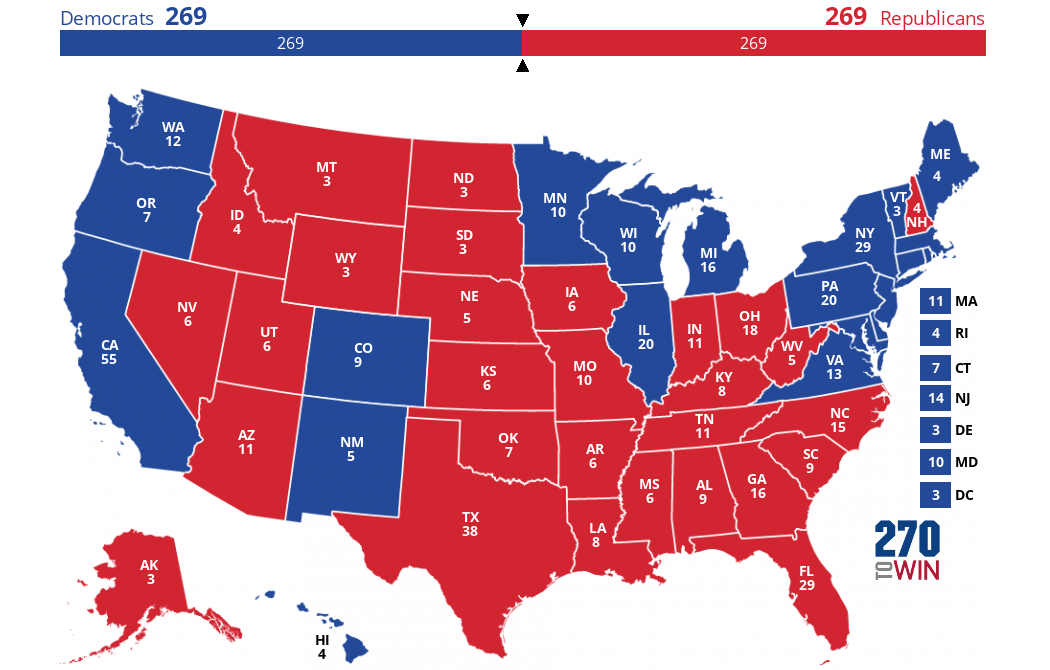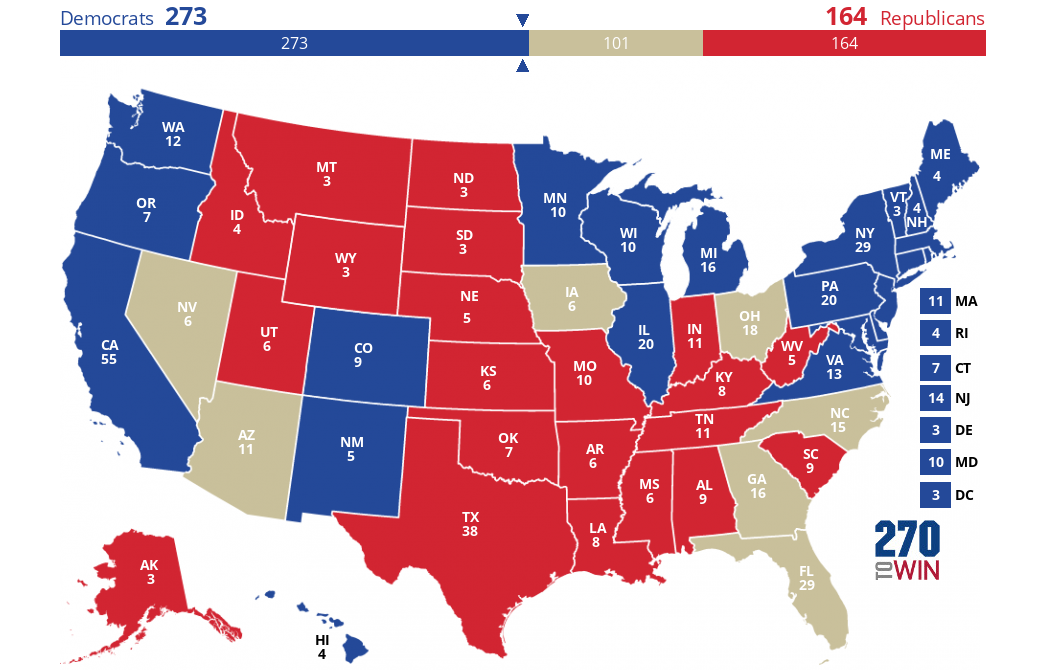Shadow1980 said:
I think there are only eight states that can be unambiguously qualified as swing states at this point in U.S. history:

Pennsylvania is often referred to as a swing state, and while the vote can sometimes get close enough to where the term "swing state" might be appropriate, but in practice it really isn't a swing state. A Republican candidate has not won PA since Bush, Sr. in 1988 and that was a relatively narrow win (a 2.3-point gap). Ever since then the Democratic candidate has won. The narrowest margin of victory was in 2004, where Kerry beat Bush by 2.5 percentage points. But in every election since 2000, the Democratic candidate has not failed to capture a majority of the vote, and the margin of victory is usually quite comfortable. While 2004 was close, the margin of victory was 9 points in 1992, 9.2 points in 1996, 4.2 points in 2000, 10.4 points in 2008, and 6.4 points in 2012. Polling averages show Hillary with a very solid lead in the state.
As for Wisconsin, it was very close in 2000 and 2004, with a gap of less than one percentage point. They also elected and re-elected a very conservative and controversial governor. That might warrant it being called a swing state. However, the Democratic candidate for President has won every election there since 1988. Dukakis won by 3.6 points, Bill Clinton by 4.3 points in 1992 and 10.3 points in 1996, and Obama won by 13.9 points in 2008 and 6.9 points in 2012. Despite the narrow margins of the 2000 & 2004 elections, Wisconsin's consistent voting for Democrat for President since 1998, as well as the comfortable margins of victory by Clinton and Obama, makes Wisconsin's status as a swing state suspect. Current polling averages show Hillary with a wide lead over Trump in the state. RCP has her up by 9.4 points, and Huffpost Pollster has her up by 11.2 points.
And Michigan is most certainly not a swing state, either. It's been solidly Democratic since 1992. The narrowest margins of victory were in 2000 & 2004 (again), but they weren't too narrow. Gore won by 5.2 points and Kerry by 3.4 points. But Clinton and Obama won the state by significant margins. Obama's 2008 win was particularly large, beating McCain 57.4% to 41%, a 16.4-point difference. As with PA and WI, polling averages suggest Hillary will keep Michigan in the Democratic column, and by a decent margin.
If Trump cannot flip at least one of those big three Rust Belt states back into the GOP column, and he almost certainly won't win any of them, that narrows his path to victory substantially. He absolutely must win Florida. If Hillary wins Florida, she automatically wins the election. She could lose every other swing state and still become President with just Florida. Even if she fails to win Florida, there are numerous arrangements of the remaining seven swing states that could give her a win. Meanwhile, even if Trump wins Florida, he has far less to work with than Hillary. If he can pick up Ohio, NC, and Virginia, then he wins, but if he fails to win even one of those, that reduces his chances even more. Let's say Hillary wins either Virginia or NC (but not both) and Trump wins Florida, Ohio, and whichever of VA and NC Hillary loses. That gives Trump a slight lead. That also leaves Colorado, Nevada, Iowa, and New Hampshire. Trump would still have to win three out of four of those states to win. But if Hillary doesn't win Virginia or NC but does win Ohio, that means Trump would have to win all four of the smaller swing states in addition to Florida, VA, and NC in order to win.
Also, note that the map I posted keeps Arizona and Georgia red, but I did that to be generous to Trump. Polling data suggests they are both in play this election, so Hillary could potentially pull off an upset and win them as well, and if she wins either one of them that narrows Trump's path to victory to almost nil. If Hillary picks up AZ, that puts her at 253, and if she wins GA, that puts her at 258. If we remove AZ & GA from the "lean GOP" column to "swing state," that gives Trump only 169 guaranteed EC votes. If Hillary wins either AZ or GA, then Trump would need to win pretty much every other swing state in order to win.
So, worst-case scenario for Trump, he loses 369 to 169, a massive 200-vote margin. And absolute best-case scenario for him, if he somehow wins every swing state, he only wins 292-246, a narrower 46-vote margin.
That's the reality of the electoral map of today's America. The Democrats have a built-in advantage in Electoral College votes. The EC might have worked in Bush, Jr.'s favor in 2000 by just barely squeaking out a "victory" in Florida (thanks, Nader supporters), but due to demographic shifts the Dems now have such a huge lead in EC votes right out of the gate that the GOP, as they currently exist, has little chance to regain the White House unless the Dems field an absolutely terrible candidate and the GOP actually nominate a more moderate and sane candidate who doesn't have diarrhea of the mouth. The GOP needs to do some serious soul-searching after this election, because not only is Trump likely to lose, but the GOP needs to realize that demagogues like Trump are not what their party needs. They need to properly vet candidates and refuse to allow certain highly-controversial candidates to run as Republicans, they need to change the rules of their primaries to allocate delegates proportionally, and they may even need to take a page out of the Democratic handbook and introduce superdelegates. With an increasingly diverse electorate, candidates like Trump who appeal mainly to white conservatives with nativist tendencies are not going to have broad national appeal. If the GOP needs some serious reforms on where they stand on some key issues as well as their nomination process. Continuing on their present path will not do them any favors in the future.
|



























































 Click the map to create your own at
Click the map to create your own at 



